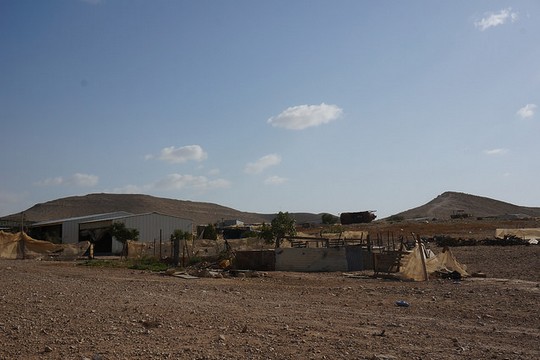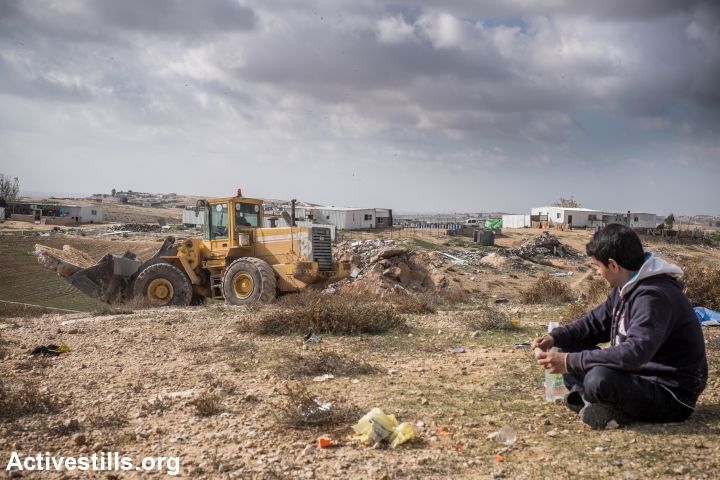According to a recent court ruling, only Bedouin need to be concerned about illegal construction. Israeli Jews, it turns out, are immune to home demolitions.
By Michal Rotem (translated by Ofer Neiman)

The Be’er Sheva Magistrates Court recently overturned an indictment against a Jewish Israeli for building three guest houses without a permit, due to “abuse of process.” In short, the defendant argued that enforcement had been selective, since the entire nearby Jewish community of Azuz — located in Israel’s Negev Desert — had been built without permits in the same area in which the defendant operates his guest rooms. He also argued that yet another site in the area was built without permits. The court accepted his argument and annulled the indictment.
It follows, then, that the authorities simply do not enforce planning and construction laws in Ramat Negev Regional Council, and that, curiously, the laws apply only to the defendant. However, a closer look at reality — as well as some buried sections in the court’s ruling — show that there is no enforcement against Jews whatsoever within the regional council’s jurisdiction. In fact, planning and constructions laws are knowingly enforced against Arabs and Bedouin. So why did the court accept the abuse of process argument? This remains unclear.
Illegal construction with the support of the authorities
The defendant, a Jewish Israeli citizen who also resides in Azuz, was charged with the construction, renovation and operation of guesthouses (“zimmerim”) in the vicinity of his community without a permit. According to the Ramat Negev Regional Council’s website, these guesthouses are “in a unique location on the cliff above the Be’erotayim stream and the path of the Ottoman railroad. The venue offers a large jacuzzi on a huge balcony, a water bar in every unit, flat screen TVs with all the cable channels, spa treatments and a variety of recreational activities in the area.” In the ruling, the defendant was quoted saying he was in need of money and therefore established the guesthouses with the support of both the Jewish Agency and the Ministry of Tourism.
The defendant further argued that “the plaintiff’s conduct was outrageous,” in light of the fact that none of the buildings in the nearby community of Azuz have permits and have been used for housing, commerce and tourism for years. He also argued that the nearby Be’erotayim Khan, which offers accommodations, meals, camel trips and even an event venue, lacks a construction and operation permit. Therefore, he argued, this was a case of selective law enforcement, in which enforcement did not apply to those who operate the Be’erotayim Khan or the residents of Azuz.
According to court’s ruling, the first guesthouses on the site were built with the help of the Jewish Agency, which also provided the defendant with funding in order to connect them to temporary water, electricity and sewage infrastructure. The judge stated that he believed the defendant when he claimed that the Ministry of Tourism — through the Regional Council — was responsible for supplying the site’s infrastructure, including a bus lot, an access road with a safety railing, a parking lot, and an effective sewage system.
According to testimonies presented in the ruling, no action had been taken against Azuz, a town whose formalization process had been frozen due to local archaeological findings and budget constraints. According to various authorities, the community, along with nearby “entrepreneurial projects,” are expected to be formalized as part of the Perfume Road Plan, which is waiting for approval, yet which the Israel Land Authority (ILA) is already promoting. It should be noted that that the judge wrote in the most explicit manner that the community’s status will not be formalized any time soon.
Enforcement against a ‘distinct population’
There are several unrecognized Bedouin villages within Ramat Negev Regional Council’s jurisdiction, including Abda, al-Bajar, Wadi Ariha and Nafha, where government authorities have been actively enforcing building and construction laws. The residents have reported that inspectors arrive on a daily basis, pressuring residents to demolish structures themselves or issuing demolition orders.

Authorities have already demolished many homes in these unrecognized villages. When the Interior Ministry’s director of the southern district’s enforcement unit, Oren Gabai, testified at the trial, he said that building and construction laws are actually being enforced within the regional council. They are simply not enforced when it comes to Jewish residents. According to the ruling, “Mr. Gabai did not dispute the claim that all the buildings in Azuz lack the required building permit.” The judge was quick to add that “Mr. Gabai agreed that the district committee is indeed active within the jurisdiction of the Ramat Negev Regional Council when it comes to the Bedouin population scattered among the local planning area.” Thus, planning and construction laws are being enforced by the council — against the Bedouin community alone.
The judge’s question as to why the district committee “does not allocate part of its enforcement resources to the handling of other flagrant construction offenses within the Ramat Negev Regional Council’s planning zone, and why it finds it appropriate to grant prima facie priority to enforcement vis-a-vis a distinct population,” (Bedouin – M.R) did not lead him to reject the abuse of justice claim. After all, planning and construction laws are being enforced within the council’s jurisdiction. Is there one type of justice for Bedouin and another for Jews in Ramat Negev? So it seems.
The judge proceeded to stipulate that all construction violations be handled “in the Bedouin sector and outside of it,” raising concerns over the gap between Azuz and the and the unrecognized villages within the council’s jurisdiction, as well the allocation of all resources to law enforcement in the Bedouin community. This, too, did not lead him to reject the abuse of justice claim.
To summarize, the abuse of justice defense works in court only when it applies to the Jewish community. The very decision to annul the indictment due to selective enforcement — despite the judge highlighting selective enforcement against the Bedouins in the same administrative area — attests to just how differently these two communities are viewed by the authorities. It should be noted that while the indictment deals with a guesthouse business, the countless structures demolished every year in Bedouin villages are mostly private homes, and as such serve a far more basic purpose. It seems that the abuse of justice claim was accepted by the court precisely in light of the fact that the law is enforced against Bedouin but not against Jews.
If all residents of the council, Jews and Bedouin, were viewed as equal citizens before the law, the state and the judge would have used enforcement against the Bedouin community as proof that the laws are not being enforced selectively. The fact that both the state and the judge have avoided this argument shows that the opposite is true — there is no equality under the law in Israel. More than that, there are two separate legal systems operating here.
Michal Rotem works for the Negev Forum for Coexistence and is based in Be’er Sheva. This story first appeared in Hebrew on Local Call, where she is a blogger. Read it here.

